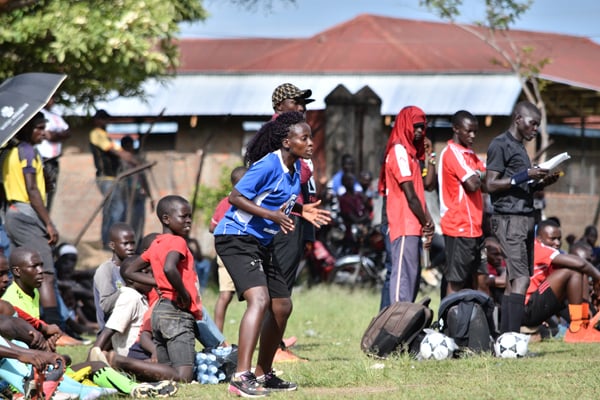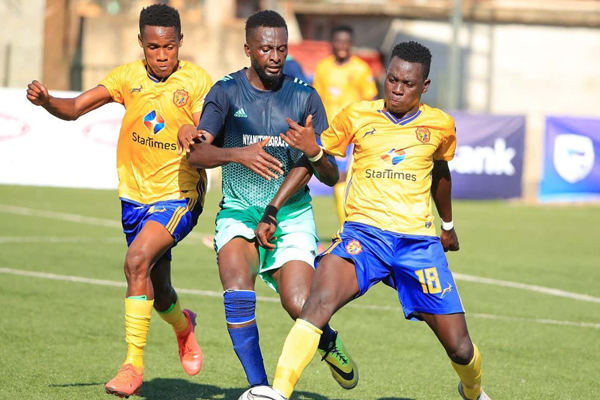Nayebare on a coaching path no woman has dared tread on

Animated. Coach Nayabare gets into her work mode in the technical area while managing Nyamitanga SS in the school football championship. PHOTO / GEORGE KATONGOLE
What you need to know:
- Trailblazer. It has been more than three decades for a woman to coach at the national post-primary football championship. In Anita Nayebare, Nyamitanga SS have broken grounds although the 28-year-old former winger does not consider herself a trailblazer.
When an animated Anita Nayebare was on the touchline shouting instructions to her players at the PTC playground in Arua, a significant milestone in schools’ football had been finally reached.
The 28-year-old from Mbarara District had become the first woman to coach a boys’ team at the annual post-primary games. Past accomplishments in the championship that dates back to 1986 but became a national championship in 1993, included women referees and games teachers.
“I’m really so happy. We’ve been stopping at zonals but now we are in the nationals. It is wonderful. As a coach that is a great opportunity. I am fortunate to be in this position and I hope this will encourage more women to know that they can achieve the same,” Nayebare said.
There has been little concern for women to be at the helm of school teams at what is dubbed as the schools’ world cup but the slow rate of uptake is thought to be due to a lack of role models.
Nayebare says only a couple of years she has been confident enough to concentrate full time on football.
She has previously coached at Nyamityobora in the Fufa Big League while she is a member of the coaching team at Mbarara Soccer Academy (MSA). She took charge at Nyamityobora during the financial crisis this season, handling the first round while also working as the team’s medic and team manager.
Coaching qualification
Her Fufa Beginner’s coaching licence complemented by two other grassroots certificates saw her rewarded with the opportunity to lead Nyamitanga to their second appearance since they made a debut in 1996.
At school football, her team’s qualifying was not prolific but you have to work extra hard to beat Nayebare’s teams.
She lost the district and regional finals but she had already made a name when she stopped the dreams of regular campaigners Mbarara High School, whom they beat in the zonal semifinals on penalties.
They then beat St Joseph’s on penalties to qualify for the district qualifiers.
Nyamitanga SS had lost the regional semifinal 1-0 to western Uganda giants Welden School but they progressed to the final after their conquerors were sanctioned of using an ineligible player.
“We had not prepared for the game when we were called. Some players were fasting but we took the opportunity with both hands and we knew it was our chance to shine,” she says.
A journey cut short
Nayebare played football in Kyeizoba Girls during her O-Level and later at Ntakke SS Wampeewo. She picked the interest in Senior One while she watched other girls play football.
“I started in goalkeeping since I was good at netball. Then I tried all positions to find where I could fit. As a left-footed player, I settled for the wing,” she said.
Losing her parents at a tender age, her guardians had reservations on her playing career and it was an opportunity for them when she got a knee injury that stopped her playing career. They had all along wanted her to become a doctor.
“I got the injury during the second term in Senior Five. My guardians were not happy and transferred me to Valley College in Mbarara. I felt bad and I wanted to escape from home. I could not think of life without football. But I resisted the temptation and followed their advice,” Nayebare said.
During her Senior Six vacation in 2017, she trained netball in Mbarara and later played for the university team. To continue with her passion, she founded a netball club last year that plays in the second division.
Graduating as an architect from Kyambogo University, she tried her hand at her profession at Chez Engineering Company but later chose to go her own way.
“From the little savings I started a boutique and a printing company. I later started an events business where I concentrate on ushering and decoration,” she said.
“Actually, even in engineering I was forced. I liked science but I was too much into sports. I thought I could instead be a designer,” she added.
The new journey
An opportunity arose to train as a grassroots coach under the “Women Take the Lead” course held in Kabale by Coaches Without Borders. Later she attended a beginner’s coaching course at Fufa Technical Centre, Njeru, and Premier Skills coaching course.
Before she had even qualified, she was in charge of City High School Mbarara in 2020. The team had qualified for the district finals before the Covid-19 pandemic struck.
“It was from that time that I realised my potential,” she said.
Nayebare had been part of the backroom staff at Nyamityobora as team manager but when a crisis hit the already relegated team, she upgraded to the role of first team coach.
“Nyamityobora had financial challenges to an extent that we could assemble players on the eve of a league game. Coordinating their play on the pitch would be a big challenge. But this taught me to be strong if I wanted to succeed. It was an invaluable lesson and that is why I don’t give up,” Nayebare, who for most of her tenure used 11 players, said.
She highlights Nyamitanga’s games teacher Sarah Nabbosa who was courageous enough to pick interest in her with recommendation from western region football chairman Mutaka Seka.
“I had been with Nyamityobora in the Big League and I found the work simple. At first some teachers doubted until I proved them wrong. When we went for zones and eliminated Mbarara High, they now support football,” she said.
The school team has actually been accompanied by five teachers who are sponsoring their stay in Arua.
“They now love football and everyone is happy,” Nayebare said.
Without a sponsor, the school struggled to make it to Arua and it shows. The team only has a dozen jerseys while an attempt to raise funds from the school alumni was almost in vain.
But after the nationals, she hopes to build momentum by playing in UMEA games.
“I see a bright future. Many coaches are encouraging me to push on and it is encouraging,” Nayebare, whose role model is Caf instructor Majidah Nantanda, said.
Nayebare’s coaching philosophy
You have to credit her tactical approach. Anita, who updates her tactical bank with YouTube coaching tutorials has hardworking teams. She does not use a single approach to the game.
When they played Jinja Progressive in their opening game in Arua, for instance, she deployed five midfielders and four defenders troubling the opponents’ attack.
In fact when Jipra took a 2-0 lead, she changed tactics and employed a flying winger on the left and a roving attack-minded midfielder. Her efforts were rewarded with a goal and the closing minutes were dominated by Nyamitanga.
“My tactics depend a lot on the circumstances. If it is a strong team, I play defensively and wait for counter-attacking opportunities. The good thing is that my players are passionate and they will not give up until the final whistle,” Nayebare said.
At Nyamitanga, she is not only the head coach but also the most qualified trainer and physio. While she plans the training sessions a day before, she also conducts the conditioning sessions and takes care of the minor injuries of the players.
“Preparation is key for me. Young players like cramming and if you get something wrong, they lose track. These players have trained with other coaches before and you have to be careful,” she said.
She credits her career path as being down to dedication and ability.
“When the games teacher introduced me, several staff members were surprised. They had their own expectations. I knew I would be under scrutiny but I am trying to do what I really enjoy doing and trying to be really good at it. I am preparing myself for bigger things and that will involve obtaining more coaching licences,” Nayebare added.
Most good schools have an abundance of talent with students on bursaries but for the Muslim-founded Nyamitanga, only 11 players are on full scholarship. None of her players has played in national games before.
“It was the first time to have bursaries for football players. We recruited randomly and assembled a team,” she says of a team that only has two players in A-Level.




